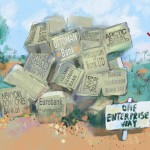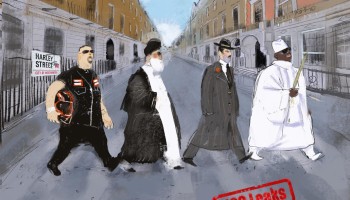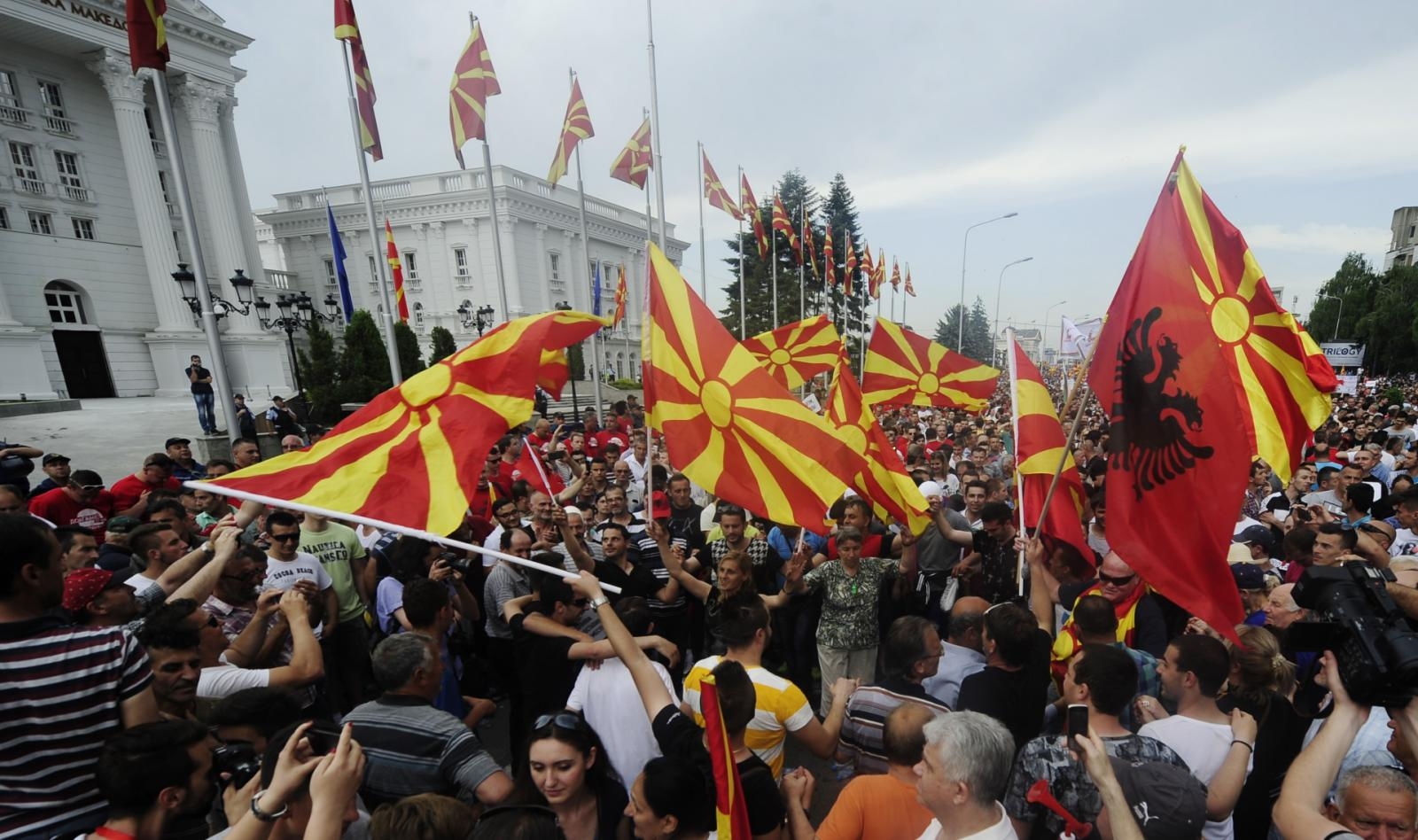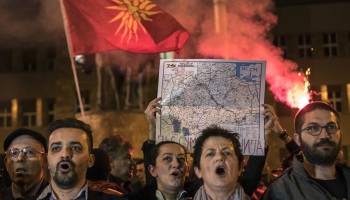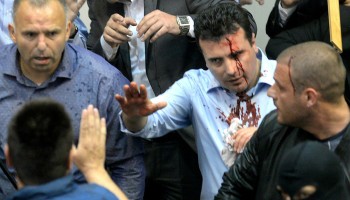When North Macedonia’s former Prime Minister Nikola Gruevski began rushing plans through Parliament to create a tax-free financial zone, government critics – and even some supporters – were alarmed and mystified.
Leaked documents now reveal that the project’s backers were conspiring from London to carve out a financial zone on the outskirts of the capital, Skopje. That zone was intended to be out of sight of domestic and international regulators.
It was 2014 and a series of corruption scandals had sparked mounting anger, which would explode into mass demonstrations the following year. The prime minister’s plan for an autonomous trade zone sounded to some like a license to commit even more financial crimes.
The lack of public information about the project was even more worrying. Now, thanks to a trove of emails obtained by information activist group Distributed Denial of Secrets and shared with OCCRP, the backers of Gruevski’s plan can be revealed.
The scheme was orchestrated behind the scenes by Formations House, a London-based firm whose founder, Nadeem Khan, was charged with facilitating money laundering that April. But he was still determined to create opaque financial zones in about a dozen countries, specifically in the Balkans and in Africa.
House of Legal Woes
British authorities charged Formations House founder Nadeem Khan in April 2014 with alleged involvement in a 100-million-euro fraud case. He was accused of facilitating money laundering through companies linked to Formations House, including Accounts Centre. But he died in September 2015 at age 54 before he could be tried.
In an emailed response to reporters’ inquiries, Formations House’s current owner, Charlotte Pawar, said the leaked data had been reported as stolen, and that the firm has faced extortion attempts. She did not provide evidence to support these claims.
The cache of internal documents includes a number of marketing presentations about so-called “trade parks,” one of them promising: “Total anonymity provided, with no visibility to U.S. or international institutions.”
Among the purported benefits of the zone would be a registry to allow companies to be created without oversight from North Macedonian or international authorities. Instead, the registry and the trade park would be run like a mini-state within a state by the owners of Formations House, according to documents and interviews with current and former officials.
While those details were hidden from the public, even the scant information that was known at the time was enough to cause serious concern.
“I thought it was a joke,” said Zoran Zaev, the country’s current prime minister, who took power in 2017 after street protests forced early elections the year before.
Even as plans for the zone advanced, opposition parties were criticizing Gruevski’s government for a series of scandals, including money laundering and state-sponsored deals that funneled money into anonymous offshore companies.
“So it seemed very bold in the given state of affairs to go and say, ‘Oh we want to make an offshore zone right here, guys, what do you say about it?’ I was astonished,” Zaev said in an interview.
The initiative would have required changing the country’s constitution to allow an autonomous body to manage the offshore zone – a fact that raised red flags with the Venice Commission, a legal advisory body of the Council of Europe.
“If all laws (other than criminal laws) are to be enacted and enforced by a managing body rather than the constitutionally recognised lawmaker and executive, this zone becomes a sort of a ‘State within a State’ separate from the existing constitutional structure,” the commission said in a 2014 legal opinion.
The commission warned that the zone could become “a haven for ‘dirty money.’”
Back in Britain, the revenue and customs authority warned Formations House in December 2016 that it was failing to adhere to UK anti-money laundering requirements, and the firm could face criminal prosecution if it did not put proper processes in place to assess its clients.
Seeking Investors
The genesis of the trade park plan was an initiative by the Gruevski government to promote North Macedonia as a magnet for foreign investment. In 2011, officials were dispatched around the globe to meet with potential investors.
One of those envoys was Oliver Sam, who was in charge of UK-related matters at the North Macedonian government agency responsible for promoting foreign investment. Sam told OCCRP and its local member center, Investigative Reporting Lab Macedonia, that he met Pawar, the current owner of Formations House, in London. At the time, the company was run by her father, Khan, the family patriarch who had founded the firm and in 2014 was charged with facilitating money laundering.
Pawar proposed a number of options, said Sam, but it was the financial zone that caught Gruevski’s eye. The prime minister then sent two officials, including his finance minister, Zoran Stavreski, to meet with Pawar. Media reported on his visit to the UK in February 2015.
The planning continued in North Macedonia, which Pawar visited multiple times, along with Darius Khan, her then 23-year-old brother. There, they met with officials, including Gruevski, Stavreski, and Ivo Ivanovski, the minister of information.
The siblings shared information about their trip on Facebook.
On February 25, 2015, Khan posted to Facebook from London’s Luton Airport, saying that he was due to meet high-ranking North Macedonian officials.
On May 13, 2015, Pawar posted a selfie showing off her outfit, a flowered blouse, a white skirt, and red shoes. “Off to meet the PM ! Summer smart,” she wrote. In the comments, she told friends the prime minister was from a country other than Britain, adding that “he was very friendly!” A few days later, she posted a photo of a church in North Macedonia.
In an emailed response to reporters’ questions, Pawar said Formations House had been “invited to discuss options the government could take to assist in retaining graduates and support economic growth of resident businesses.”
“We are not affiliated with any government persons current or previous in Macedonia,” she added.
However, her personal website, Global Pawar, says she is a consultant to the government on issues such as “strategic input for the implementation of better government back office administration technology,” and “diversification of export industry goals.”
Constitutional Controversy
Creating the trade park required an amendment to the North Macedonian constitution, because of the “nearly total exclusion of this zone from the legal order of the state,” noted the Venice Commission, the Council of Europe’s legal advisory group.
The government simultaneously suggested a separate – and distracting – amendment: restricting the constitutional definition of marriage to between one man and one woman, thereby paving the way to outlaw same-sex unions.
The proposed amendment seemed to come out of nowhere, recalled Liljana Popovska, a member of parliament from the Green Party.
“They wanted to use the controversy and the debate that the marriage thing would spark,” she said. But the smokescreen failed to detract the public’s attention.
“All eyes were turned to the sick plan of making an offshore in an already troubled Balkan country that is on the route of every single organized crime group in the Balkans, and has weak institutions and highly corrupt government.”
Still, the government pushed ahead with the plan. Stavreski, then finance minister, insisted in a televised debate in late 2014 that the intention was not to create an “offshore zone.” He promised that “all the rules applicable to vetting funds to prevent capital inflows from unidentified sources will apply.”
Stavreski did not respond to multiple requests for comment.
Sasha Grujevski, a state counselor for foreign direct investments, participated in the planning as part of his role in Gruevski’s cabinet. Grujevski told OCCRP that the zone would be called “Trade Park Macedonia.”
That matched the names of zones the Formations House team planned in other countries. It also echoed Trade Park Corporation, the Hong Kong-registered company that was founded at the time by Pawar, who was using the spin-off firm to push its global projects.
The proposed constellation of offshore company registries and tax-free trade zones included a proposal for a private beach in São Tomé and Principe that would focus on tourism, and another in Cameroon to cultivate cannabis.
But the biggest success came in 2013 when then-Gambian President Yahya Jammeh gave his blessing to a proposed offshore zone and private companies registry.
Though Gambia never passed a law to allow the zone, Formation House began churning out shell companies and fake banks from that private registry. Customers included a U.S. and EU-sanctioned Iranian oil company, the former president of a Swedish organized crime group, and a cast of convicted fraudsters.
In North Macedonia, meanwhile, even some of the prime minister’s allies were cooling on the plan.
Even as Grujevski, the cabinet member, helped prepare the ground for the trade zone, he had concerns, he said, including the intention to allow it to operate according to its own laws and in secret. “We were asking that the registration of companies should have been done through the Macedonian business registry and in accordance with our law,” said Grujevski. “And I told that to the prime minister, but he continued tasking the team to work on the idea [of a registry that would be run by Formations House].”
More Balkan Plans
Formations House also zeroed in on Mostar, a city in Bosnia and Herzegovina, as a location for an offshore financial zone, according to a proposal found in the leaked files., The zone’s existence has not previously been reported.
Trade Parked
Leaked correspondence from the summer of 2015 shows Grujevski and Pawar discussing the steps they needed to take to ensure her management company would be awarded the tender to manage the project, which they referred to as the Technology Innovation Zone, or the TIDZ. Emails show they collaborated on drafting the letter of intent [LOI], which would need to be submitted to North Macedonian authorities in order for the project to move forward.
In one exchange, Grujevski advised Pawar to submit a new draft that did not include the name of her management company as the operator of the trade park, because the selection had not yet been named.
“It would be illegal for anyone [from] the Government to [be] sent LOI with the name of the future TIDZ management company without having the whole procedure for its establishment in place,” he wrote.
After Pawar complied with his instructions, he responded: “We will take it from here.”
Shortly after that exchange, political events in North Macedonia overtook the planning process.
A series of leaked recordings revealed that then-Prime Minister Gruevski and other officials were discussing corrupt deals while plotting to clamp down on journalists and judges and manipulate elections. The revelations sparked massive protests, with the main opposition party led by Zaev, the current prime minister, boycotting Parliament.
The EU was forced to intervene, brokering new elections in 2016. Gruevski was convicted of influencing government officials in the unlawful purchase of a luxury vehicle and, facing a two-year sentence, fled to Hungary, where he has been granted asylum. Gruevski did not respond to a request for comment.
Grujevski, the former cabinet member, is now an advisor to the current government. He is making plans for a “technology innovation zone” he insisted would be different from the previous government’s project with Formations House. The new zone for foreign investors will follow the North Macedonian laws governing free economic zones, he stressed.
“This was my idea from a long time ago. It started with the previous prime minister and Mr. Zaev truly liked the project, so it will go on,” he said.



